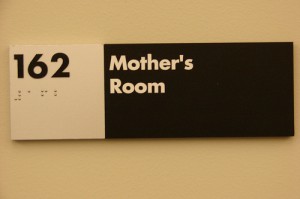Reasonable Break Time for Nursing Mothers
by Kori Martin, JD, LLLL | June 27, 2011 6:17 pm

As most of you have probably heard by now, the new federal healthcare legislation (The Patient Protection and Affordable Care Act) includes a provision creating new baseline protections for working and pumping moms. Since there is still a great deal of confusion about what this law actually does and to whom it applies, Best for Babes asked me to write a quick overview of this law, similar to the piece I wrote for the current issue of Clinical Lactation.
Who is covered?
-The Reasonable Break Time for Nursing Mothers law amends the Fair Labor Standards Act (“FLSA”), and therefore, only applies to those in FLSA non-exempt jobs. A worker can check her pay stub to determine her job’s FLSA exempt or non-exempt status. As a general rule, most retail, restaurant, and other jobs that pay by the hour are not exempt from the FLSA and thus are subject to the law. Most salaried positions that do not
receive overtime pay are exempt from the FLSA, and thus mothers in these positions are not covered by the new law.
-Employers with fewer than 50 employees are not automatically exempt, but may be able to avoid compliance by arguing that the law creates an undue hardship. The undue hardship exemption is not available to employers with more than 50 employees, but fewer than 50 at a particular office.
-This law only covers mothers pumping for a baby under one year of age.
What are the protections?
-The Reasonable Break Time for Nursing Mothers law requires that employers give nursing mothers covered by this law reasonable time to express milk. It does not require that break time used for milk expression be paid break time. The law does not prescribe requirements as to the frequency or duration of pumping breaks, but instead looks to what is reasonable in a given situation. The Department of Labor’s Wages and Hours
Division (WHD), which has been charged with interpretation and enforcement of the Reasonable Break Time for Nursing Mothers law “expects that nursing mothers typically will need breaks to express milk two to three times during an eight hour shift.” (Request for information)
-The law requires that employers provide breastfeeding employees with a reasonable location to express milk. Employers do not have to provide a dedicated pumping room, but the location must be “a place, other than the bathroom, that is shielded from view and free from intrusion from coworkers and the public.” The WHD is still trying to determine what accommodations are necessary for employees who work in more non-traditional settings that may not have private space available.
What is not included in this law?
-Break time used for milk expression does not have to be paid. However, when other employees are already provided with compensated breaks, this law does require that mothers who use their break time to express milk be compensated in the same way as other employees’ breaks. An employee must be completely relieved from duty while taking a break covered by this law, or the employer must compensate the employee for her time.
-Nothing requires an employer to allow a mother to bring her baby to work. This law only covers milk expression and pumping, not direct breastfeeding.
-Employers do not have to provide a dedicated pumping room, pumping equipment, or a refrigerator for milk storage, but they must provide a place for the mother to store her equipment and cooler for expressed milk.
What about state laws?
-The Reasonable Break Time for Nursing Mothers law provides a baseline of coverage but does not preempt state laws. States may provide broader protections than this, and many do.
Where can working mothers learn more?
-More information about the Federal Reasonable Break Time for Nursing Mothers law can be found through the U.S. Breastfeeding Committee and the Department of Labor.
-A nursing mother who feels her rights under this law have been violated is urged to file a complaint through the WHD.
What has your experience with breastfeeding and work been like? Did it change when the law changed?
image credit: ACPL
 Kori Martin, JD, LLLL lives in Austin, Texas, with her husband and three breastfed children. In addition to leading a local La Leche League group, Kori serves as the Legal Professional Liaison for LLL of Texas, writes on topics related to breastfeeding and the law, and is a member of her state and local breastfeeding coalitions. A graduate with honors from The University of Texas School of Law, instead of practicing as an attorney, Kori works passionately to help mothers and babies overcome barriers to breastfeeding success.
Kori Martin, JD, LLLL lives in Austin, Texas, with her husband and three breastfed children. In addition to leading a local La Leche League group, Kori serves as the Legal Professional Liaison for LLL of Texas, writes on topics related to breastfeeding and the law, and is a member of her state and local breastfeeding coalitions. A graduate with honors from The University of Texas School of Law, instead of practicing as an attorney, Kori works passionately to help mothers and babies overcome barriers to breastfeeding success.
Source URL: http://www.bestforbabes.org/reasonable-break-time-for-nursing-mothers